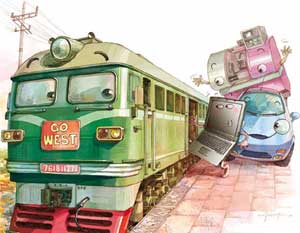Assad warns of 'earthquake' if West intervenes
Updated: 2011-10-30 10:11
(Agencies)
|
|||||||||
BEIRUT- Western powers risk causing an "earthquake" across the Middle East if they intervene in Syria, President Bashar al-Assad said.
Assad's warning came ahead of Syrian government talks on Sunday with the Arab League aimed at starting a dialogue between the government and opposition and ending violence which has escalated across Syria in recent days.
Activists said Syrian forces killed more than 50 civilians in the last 48 hours and one activist group said suspected army deserters killed 30 soldiers in clashes in the city of Homs and in an ambush in the northern province of Idlib on Saturday.
Assad's suppression of the seven-month uprising has drawn criticism from the United Nations and Arab League. Western governments have called on him to step down and imposed sanctions on Syrian oil exports and state businesses.
Western countries "are going to ratchet up the pressure, definitely", Assad told Britain's Sunday Telegraph newspaper.
"But Syria is different in every respect from Egypt, Tunisia, Yemen. The history is different. The politics is different."
"Syria is the hub now in this region. It is the fault line, and if you play with the ground you will cause an earthquake."
NATO military intervention in Libya played a decisive role in toppling Muammar Gaddafi, the third Arab leader to be overthrown after the revolutions in Tunisia and Egypt.
Western nations have shown no appetite to repeat their Libyan operation in Syria, but demonstrators are increasingly calling for a "no-fly zone" over their country.
"Do you want to see another Afghanistan, or tens of Afghanistans?" Assad said. "Any problem in Syria will burn the whole region. If the plan is to divide Syria, that is to divide the whole region."
Since the start of protests in March, Syrian authorities have blamed the violence on foreign-backed gunmen and religious extremists they say have killed 1,100 soldiers and police.
Syria has barred most international media, making it hard to verify accounts from activists and authorities.











